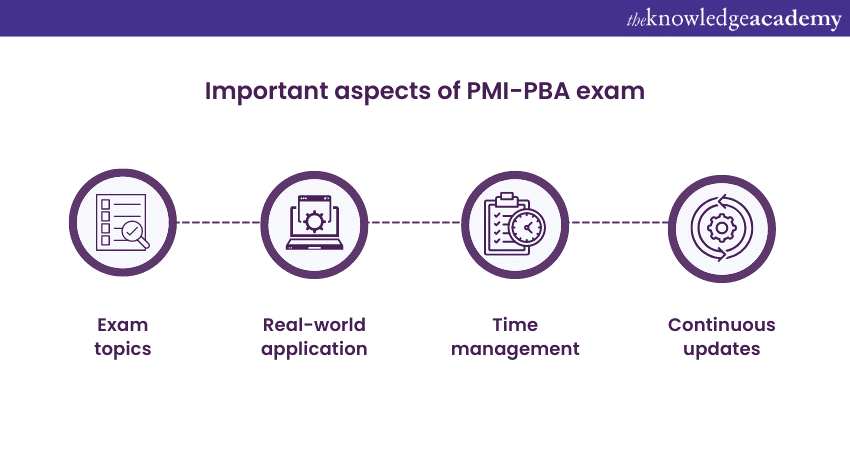We may not have the course you’re looking for. If you enquire or give us a call on +1 6474932992 and speak to our training experts, we may still be able to help with your training requirements.
We ensure quality, budget-alignment, and timely delivery by our expert instructors.

The PMI-PBA certification is a globally recognised credential that demonstrates a Business Analyst's proficiency in the field of business analysis. The certification is provided by the Project Management Institute (PMI), a leading professional association for Project Management professionals, the exam for PMI-PBA serves as a comprehensive assessment of a Business Analyst's knowledge, skills, and abilities. If you are an aspiring Business Analyst, it is necessary to know the details and the PMI-PBA Exam Difficulty level.
Business analysts can distinguish themselves in the competitive job market by earning the PMI-PBA certification. The certification showcases their commitment to professional development and dedication to staying updated with industry best practices.
Table of Contents
1) Examination details of PMI-PBA
2) PMI-PBA Exam Difficulty level
a) Exam topics
b) Real world application
c) Time management
d) Continuous updates
3) Conclusion
Examination details of PMI-PBA
The Project Management Institute-Professional in Business Analysis (PMI-PBA) Exam, is a certification exam designed for Business Analysts. It is offered by PMI - a renowned professional association for Project Management professionals. The Benefits of PMI-PBA Certification Exam offer valuable insights into its impact on career growth. Let's look into various aspects of the exam for PMI-PBA.
Exam format
The exam for PMI-PBA consists of multiple-choice questions that test the candidate's understanding of these topics. The questions assess the candidate's ability to apply business analysis concepts and techniques to real-world scenarios. The exam evaluates the candidate's knowledge of industry standards, best practices, and approaches to Business Analysis.
Eligibility
In order to qualify for the exam, PMI has established certain prerequisites that candidates must fulfil. These prerequisites entail a mixture of educational and professional experience in business analysis.
|
Eligibility criteria |
Description |
|
Educational requirements |
Secondary degree (high school diploma, associate's degree, or equivalent) OR Global equivalent (diploma, certificate, or degree from an accredited educational institution) |
|
Professional experience requirements |
Minimum 4,500 hours of business analysis experience within the past eight consecutive years and minimum 2,000 hours of participating in project teams within the past eight consecutive years. OR Minimum 7,500 hours of business analysis experience within the past eight consecutive years. |
|
General education or experience hours |
Minimum 35 contact hours of formal education in business analysis (e.g., workshops, training programs, or academic courses) |
Register for our PMP® Training Courses to improve your project management skills today!
PMI-PBA Exam Difficulty level
The exam for PMI-PBA is known for its challenging nature. It requires a deep understanding of business analysis practices and the ability to apply these in real-world scenarios. However, with proper preparation and a structured study timetable, you can improve your chances of success. Several factors contribute to the perceived difficulty of the exam. These include:

1) Exam topics
The exam content is based on the Examination Content Outline of PMI-PBA, which outlines the knowledge areas and tasks a Business Analyst should be familiar with. It covers various topics, including business analysis planning and monitoring, elicitation and collaboration, strategy analysis, and requirements analysis and design definition.
According to PMI, the exam covers certain domains which reflect the knowledge areas and tasks that business analysts need to be proficient in to fulfil their role successfully. The domains are as follows:
|
Domain |
Domain name |
Description |
|
Domain 1 |
Needs Assessment |
a) Identify business problems and opportunities b) Define project objectives and goals c) Conduct stakeholder analysis |
|
Domain 2 |
Analysis |
a) Develop a business analysis plan b) Identify and analyse business analysis activities and tasks c) Define requirements management processes |
|
Domain 3 |
Analysis |
a) Conduct requirements elicitation and analysis b) Identify and prioritise requirements c) Assess requirements feasibility and define solution scope |
|
Domain 4 |
Traceability and monitoring |
a) Establish and maintain requirements traceability b) Monitor requirements for changes and updates c) Manage requirements conflicts and issue |
|
Domain 5 |
Evaluation |
a) Evaluate solution performance and benefits b) Conduct post-implementation reviews c) Identify opportunities for improvement |
|
Domain 6 |
Tools and techniques |
a) Utilize business analysis tools and techniques b) Apply requirements management software c) Use modelling techniques for requirements visualisation |
|
Domain 7 |
Stakeholder engagement |
a) Identify and engage stakeholders b) Facilitate collaboration and communication c) Manage stakeholder expectations |
2) Real-world application
The exam for PMI-PBA assesses candidates' ability to apply business analysis concepts and techniques to real-world scenarios. It goes beyond theoretical knowledge and requires candidates to demonstrate practical understanding through scenario-based questions. This aspect makes the exam challenging as candidates need to analyse complex situations, evaluate options, and make informed decisions within the context of business analysis.
3) Time management
Get the details on PMI-PBA vs PMP to choose the right path!
Time management is a significant challenge in the exam for PMI-PBA. Candidates must efficiently allocate their time across the questions, ensuring they have sufficient time to read and comprehend each scenario, analyse the options, and select the most appropriate answer.
4) Continuous updates
The field of business analysis is dynamic, with new methodologies, tools, and practices emerging regularly. The exam for PMI-PBA evolves to reflect these changes, ensuring that certified professionals stay current with the latest developments in the industry. Candidates must stay updated with the evolving field, study new concepts, and adapt their knowledge to meet the exam requirements.
Ready to progress in your business analysis career? Register in our PMI Professional In Business Analysis PMI PBA® Course now!
Conclusion
In conclusion, the exam for PMI-PBA is a challenging yet rewarding certification for business analysts seeking to validate their expertise and advance their careers. The exam covers a broad range of knowledge areas and tasks, requiring candidates to learn about business analysis principles and practices. We hope we have helped you gain an understanding of the PMI-PBA Exam Difficulty level.
Are you ready to elevate your Project Management career? Sign up for our PMP® Certification Training Course today!






 Top Rated Course
Top Rated Course




 If you wish to make any changes to your course, please
If you wish to make any changes to your course, please


